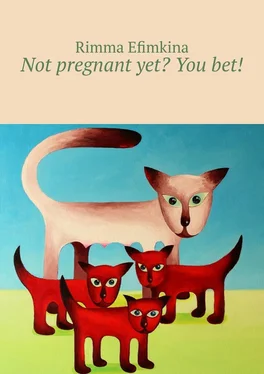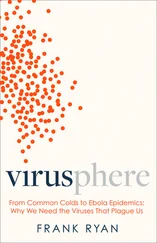Rimma Efimkina - Not pregnant yet? You bet!
Здесь есть возможность читать онлайн «Rimma Efimkina - Not pregnant yet? You bet!» — ознакомительный отрывок электронной книги совершенно бесплатно, а после прочтения отрывка купить полную версию. В некоторых случаях можно слушать аудио, скачать через торрент в формате fb2 и присутствует краткое содержание. ISBN: , Жанр: psy_generic, на английском языке. Описание произведения, (предисловие) а так же отзывы посетителей доступны на портале библиотеки ЛибКат.
- Название:Not pregnant yet? You bet!
- Автор:
- Жанр:
- Год:неизвестен
- ISBN:9785005177919
- Рейтинг книги:5 / 5. Голосов: 1
-
Избранное:Добавить в избранное
- Отзывы:
-
Ваша оценка:
- 100
- 1
- 2
- 3
- 4
- 5
Not pregnant yet? You bet!: краткое содержание, описание и аннотация
Предлагаем к чтению аннотацию, описание, краткое содержание или предисловие (зависит от того, что написал сам автор книги «Not pregnant yet? You bet!»). Если вы не нашли необходимую информацию о книге — напишите в комментариях, мы постараемся отыскать её.
Not pregnant yet? You bet! — читать онлайн ознакомительный отрывок
Ниже представлен текст книги, разбитый по страницам. Система сохранения места последней прочитанной страницы, позволяет с удобством читать онлайн бесплатно книгу «Not pregnant yet? You bet!», без необходимости каждый раз заново искать на чём Вы остановились. Поставьте закладку, и сможете в любой момент перейти на страницу, на которой закончили чтение.
Интервал:
Закладка:
Childbirth is the third big initiation for a woman. It means discovering her creative power to make, produce, and I don’t mean just literally, but also figuratively. Everything we make: things, ideas, projects, books, children, even ourselves, our life-story are products of our creativity. If we can’t find our purpose in life at this point, we risk becoming infertile, because for our body this means betraying oneself. Infertility is a message that a woman lost her way in life, lost her purpose, cannot hear the voice of her soul.
Finally, the third big initiation is going from childbearing age to late maturity. Milton Erickson said that with the first period a girl becomes a mother – it’s joy; with the last period she becomes a grandmother – it’s happiness. Now the goal is to cultivate powerful qualities valued by people in the young generation. Now she is the person who initiates others, she has the power to punish and pardon depending on whether they succeed or not. In fairy-tales such a person is the one who gives the gifts – Old Mother Frost, Baba Yaga – they reward the hero and punish the anti-hero. In real life this is a wise mentor who feels “like an old grey dog” when looking at cocky young people. The main challenge of this stage for a woman is to leave the territory where she felt valued, respected and in demand by our unconscious society when she was young.
Unfortunately, we as a culture are not any more mature and conscious than teenages. Carl Young noted in despair that for the most part our old people try to compete with the young. In the United States it is almost an ideal for the father to be the brother of his sons, and for the mother if possible to be the younger sister of her daughter 6 6 Carl Jung, Modern Man In Search Of A Soul .
. Clinging to one’s youth as well as an adolescent clings to his childhood could become the main issue at this stage. This means a person is unable to leave the previous stage. The aging Queen from Pushkin’s fairy-tale of The Dead Princess And Seven Knights asked her magic mirror if she was the prettiest woman in the kingdom jealousy comparing herself to her step-daughter. And this is the question every woman asks herself when the time for this initiation comes.
Women experience each transition as internal and external transformation. Internal transformation is a near-death experience when old non-adaptive patterns of behaviormust die-away to give place to new ones. This “destruction-transformation-reconstruction” cycle causes suffering, pain, a range of negative feelings, nightmares on the subject of death. Externally these transitions were accompanied by different cultural rituals. Finally, as a result of each initiations a person become more and more conscious.
Initiation in fairy-tales
Fairytales teach us so many great things: don’t take apples from strangers, best men look like beasts, and a girl needs to sleep around to find her true love.
Internet memeFairy-tales reflect at least two thousand years of initiations experience. However, it is important to keep in mind that fairy-tales were not made to entertain, their true purpose was to pass on important philosophical, spiritual and psychological notions in such a form that even a baby could get it. For example, the most common fairy-tales tell a story of transition from childhood to adulthood. It is at this stage that a person causes many problems to society. This is why the society made special rituals for them to go through the crisis and become independent, i.e. stop being a burden on others.
Sometimes it happens, sometimes it does not. In fairy-tales hero and false-heroes show examples of successful and unsuccessful initiations. For example, in Russian fairy-tale Old Father Frost there are both a hero – the step-daughter, and a false-hero – her step-sister. The step-mother forces her step-daughter out of the house to the winter forest where she would die, and she sits in the snow under a tree waiting for anything to happen.
This is typical for fairy-tale heroes – go somewhere unknown, bring something unknown . Psychologically speaking, a person should experience adult life to become self-confident and self-sufficient as a result. They blindly move into the unknown and the only thing they can rely upon is believing in miracles. Eric Erikson brilliantly defined the uncertainty of initiation process when he said that, just like a trapeze artist, a young man should in one powerful move let go of his childhood, jump and seize his maturity. He should make all this in a short period of time, while counting on those of whom he should let go of, and on those who are to catch him on the other side 7 7 Cited from Robert Frager, James Fadiman, Personality & Personal Growth .
. This way E. Ericson states that this transition is both unreal, impossible and necessary.
When Old Father Frost meets half-frozen girl in the midst of winter forest, he asks her: “Are you warm enough, beautiful?” – the step-daughter says the only right thing to say: “I am warm, Father”. Although, trivially speaking, she tells a lie, still her answer is correct. It is correct, because in this way she says she agrees to go through with the challenge. Mind you, that she asks for no guarantees in return, she agrees with either outcome, otherwise it wouldn’t have been a challenge. This is what we call a near-death experience, and this kind of experience is necessary to be initiated. Old Father Frost rewards the girl for this by giving her rich dowry, as well as a decent fiancé. When she returns home, her step-mother feels disgraced and jealous that her own daughter did not receive any gifts from Old Father Frost.
Old Farther Frost plays a role of gift-giver in this fairy-tale. Baba Yaga, Old Mother Frost are also gift-givers from other fairy-tales. There was a time when this function was performed by shamans, the elderly of the a tribe, witch-men. Nowadays it is not defined, but it was, is and will be there as long as the mankind exists. Presently, this role was adopted by non-medical psychotherapists who work to “bring to order” the minds of their clients. As mentioned above, cultivating humane values among the youth is the main task of the older generation, one of these values being psychological separation of grown-up children from their parents and their ability to live their own lives.
Old Farther Frost fairy-tale does not end with the initiation of the heroine. It shows yet another pattern of behavior inherent in people, not a few people for that matter. Those characters who demonstrate non-adaptive strategies of behavior are usually called false-heroes. In this fairytale it is the step-mother’s own daughter who follows her step-sister. This is already wrong as it is, because going by well-trodden road is not the same as going to terra incognita. But the girl makes another mistake – she mistreats Old Farther Frost by demanding to give her a fiancé and dowry. The forthcoming punishment is that she dies in one version of the fairy-tale, and in the other she goes back disgraced and she stays unnoticed by potential suitors, because she is still a girl, not a grown-up woman.
All grown-ups were once children, so we all know this and other similar fairy-tales, so we all have both ways – right and wrong – imprinted in our minds. However, it does not guarantee that we chose to be heroes when it comes to making existential choices. When it comes to motherhood initiation we are scared to death, because even today, despite all medical advances, there is a risk of dying in labor. And if there is a risk of death, there are feeling accompanying the near-death experience: fear, panic, frustration, anger towards the “guilty”, bitterness, self-pity, desperation. We do not really have much choice, it’s either be scared and do it, or be scared and not to do it. In the first case we are heroes, in the second one we are false-heroes.
Читать дальшеИнтервал:
Закладка:
Похожие книги на «Not pregnant yet? You bet!»
Представляем Вашему вниманию похожие книги на «Not pregnant yet? You bet!» списком для выбора. Мы отобрали схожую по названию и смыслу литературу в надежде предоставить читателям больше вариантов отыскать новые, интересные, ещё непрочитанные произведения.
Обсуждение, отзывы о книге «Not pregnant yet? You bet!» и просто собственные мнения читателей. Оставьте ваши комментарии, напишите, что Вы думаете о произведении, его смысле или главных героях. Укажите что конкретно понравилось, а что нет, и почему Вы так считаете.





![Ally Carter - [Gallagher Girls 01] I'd Tell You I Love You But Then I'd Have to Kill You](/books/262179/ally-carter-gallagher-girls-01-i-d-tell-you-i-lo-thumb.webp)






